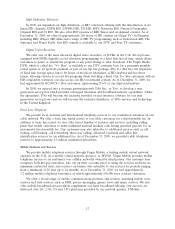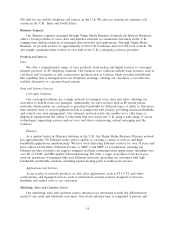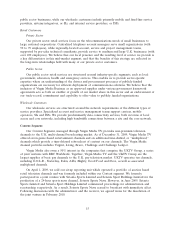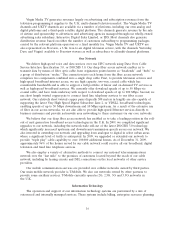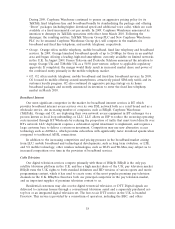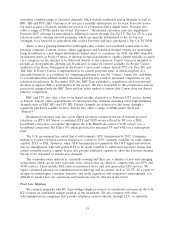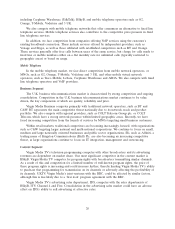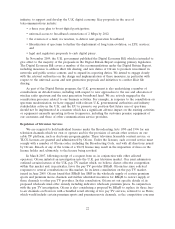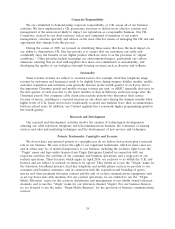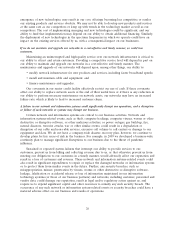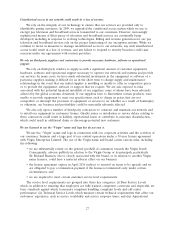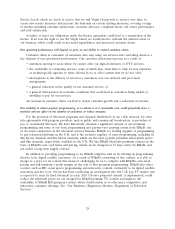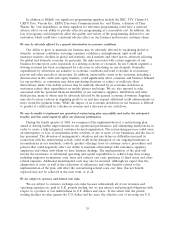Virgin Media 2009 Annual Report Download - page 24
Download and view the complete annual report
Please find page 24 of the 2009 Virgin Media annual report below. You can navigate through the pages in the report by either clicking on the pages listed below, or by using the keyword search tool below to find specific information within the annual report.industry, to support and develop the U.K. digital economy. Key proposals in the area of
telecommunications include:
• a three year plan to boost digital participation;
• universal access to broadband connections of 2 Mbps by 2012;
• the creation of a fund, via taxation, to deliver next generation broadband;
• liberalization of spectrum to further the deployment of long term evolution, or LTE, services;
and
• legal and regulatory proposals to curb digital piracy.
In November 2009, the U.K. government published the Digital Economy Bill, which is intended to
give effect to the majority of the proposals in the Digital Britain Report requiring primary legislation.
The Digital Economy Bill covers a number of the recommendations under the Digital Britain Report,
including measures to address illicit file sharing, and new duties of Ofcom to promote investment in
networks and public service content, and to expand its reporting duties. We intend to engage closely
with the relevant authorities on the design and implementation of these measures, in particular with
respect to the universal access and next generation proposals and initiatives to combat illicit file
sharing.
As part of the Digital Britain program, the U.K. government is also undertaking a number of
consultations on detailed issues, including with respect to new approaches to the use and allocation of
wireless radio spectrum and the next generation broadband fund. We are actively engaged in the
consultation processes related to our business activities. For example, in response to the consultation on
spectrum modernization, we have engaged with relevant U.K. governmental authorities and industry
stakeholders active in the U.K. and the EU to promote our position that future uses of spectrum
should not be implemented in a manner which has a significant adverse impact on the existing activities
or equipment currently operating in those frequencies, including the customer premise equipment of
our customers and those of other communications service providers.
Regulation of Television Services
We are required to hold individual licenses under the Broadcasting Acts 1990 and 1996 for any
television channels which we own or operate and for the provision of certain other services on our
cable TV platform, such as electronic program guides. These television licensable content service, or
TLCS, licenses are granted and administered by Ofcom. Under the licenses, each covered service must
comply with a number of Ofcom codes, including the Broadcasting Code, and with all directions issued
by Ofcom. Breach of any of the terms of a TLCS license may result in the imposition of fines on the
license holder and, ultimately, to the license being revoked.
In March 2007, following receipt of a request from us, in conjunction with other affected
operators, Ofcom initiated an investigation into the U.K. pay television market. Our joint submission
outlined certain features of the U.K. pay TV market which, we believe, distort effective competition
within this market and, in particular, favor the pay TV provider BSkyB. Ofcom has since solicited
responses to several consultations on this market. In its latest consultation on the pay TV market,
issued in June 2009, Ofcom found that BSkyB has SMP in the wholesale supply of certain premium
sports and premium movie channels and further identified incentives for BSkyB to restrict supply of
these channels to other pay TV providers. In this consultation, Ofcom set out specific details of its
proposed wholesale must-offer remedy including indicative wholesale premium prices. In conjunction
with the pay TV investigation, Ofcom is also considering a proposal by BSkyB to replace its three free-
to-air channels on Freeview with a bundled retail offering of five pay TV services, referred to as Picnic,
which would include certain premium sports and premium movie channels, as the competition concerns
22


